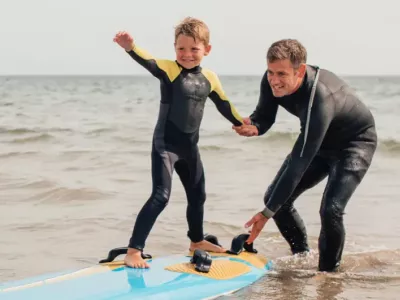School’s Back! Parenting Tips To Boost Kids’ Self-esteem And Confidence For A New Year

As kids across the country return to school, experts at the Triple P – Positive Parenting Program are highlighting the important role that self-esteem and confidence play in a child’s academic, social, and emotional success – and how it may be one of the most protective factors against anxiety and depression.
Triple P International Country Director, Carol Markie-Dadds, said with two in five families in Australia experiencing school refusal, and many more facing cost-of-living pressures, the start of a new school year is adding an extra layer of parental stress and worry.
“Children and young people may have mixed emotions in the lead up to school, from excitement to dread – this is normal. They may be worried about fitting in or coping with workloads, or they might have friendship concerns, are worried about starting a new year level or going to a new school,” Ms Markie-Dadds said.
“A practical way parents and carers can help their children positively transition into a new school year and help them face any challenges that come their way is to focus on boosting their self-esteem, confidence, and coping skills,” she said.
“Research shows children and teens who have healthy self-esteem are likely to experience a range of lifelong benefits. This includes being more eager to learn, having more success at school, being more cooperative, having stronger social skills, and most importantly, improved mental and physical health,” she said.
“Children aren’t born with a sense of confidence and not all children develop it at the same rate or age, or with the same level of success,” Carol said. “The great news is that parents and carers can help children by modelling and teaching these skills and giving their child opportunities to practise them at home, school and in the community.”
Triple P’s top tips for building children’s self-esteem and confidence
- Praise your child’s efforts, not just their results or achievements. Talk about the things your child does well and let them know you’re proud of them for trying and making progress.
- Be a positive role model. Kids learn a lot by watching how you handle setbacks. Talk with them about how a problem can be worked out one step at a time. Try to respond calmly when things don’t go as planned.
- Guide them to solve their own problems, rather than trying to solve everything for them. Simply pausing and giving them a few moments to figure something out can help, or ask questions such as “What have you tried so far?”
- Show confidence in your child’s abilities by letting them do things for themselves. This helps them learn what they can do, and that they have some control over their world.
- Respond to any negative self-talk or feelings of disappointment by letting your child know that it’s okay to fail or make mistakes. Try talking to your child in a positive, optimistic way about the year ahead.
- Encourage your child to name their emotions, express their ideas, and make their own decisions. Give your child a sense of agency around the things they enjoy doing, rather than pushing them to do an activity you want, like playing a particular sport or musical instrument.
“Children with low self-esteem are at risk of more serious emotional concerns such as anxiety or depression. If low self-esteem or a lack of confidence is impacting your child’s day-to-day life, it may be time to chat with your GP, seek professional health advice, or check out the evidence-based parenting support program Fear-Less Triple P Online,” Ms Markie-Dadds said.

